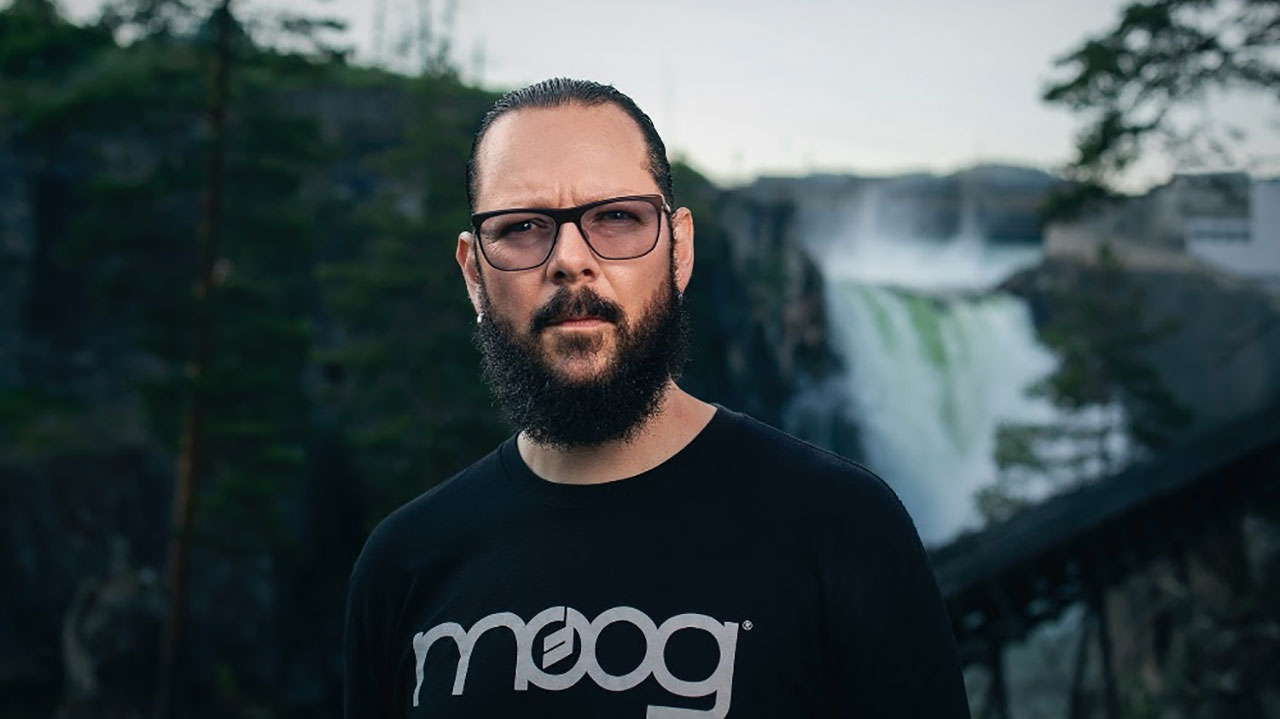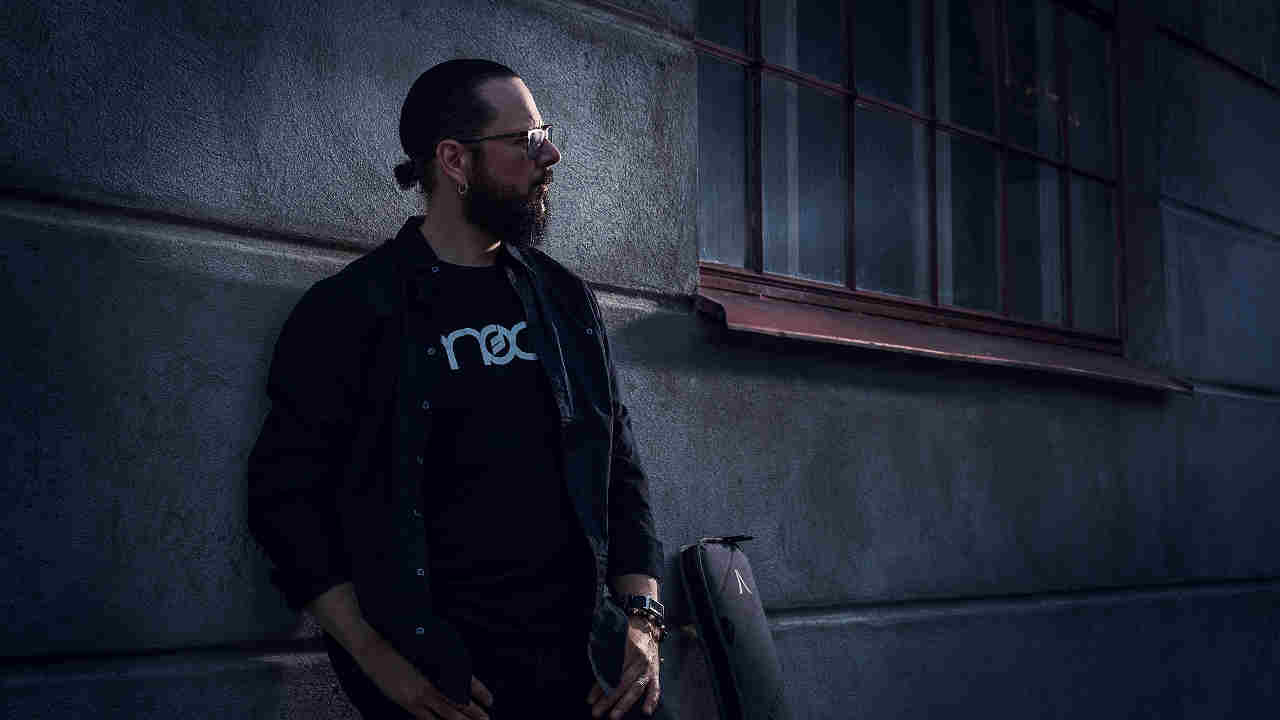Ihsahn has spent much of his adult life preparing for social isolation. “My wife and I are in the fortunate position of living in quite rural surroundings for the last 22 years, so we're used to not mixing with other people,” he says. “But everything has affected us quite a bit. I had this immense year of touring lined up with my solo stuff and Emperor, which obviously never happened. On the other hand, I had July off.”
Enforced downtime aside, 2020 has been a banner year for one of modern metal’s great adventurers. In February, he released the Telemark EP, which saw him fully reconnecting with his black metal roots for the first time in decades.
Now comes the follow-up Pharos, which works as both a companion piece and inverse reflection of its predecessor. Where Telemark was deliberately abrasive, this latest EP finds Ihsahn venturing into art-pop territory, incorporating throwback electronic textures, billowing choruses, and, on the title track, the whiff of orchestral, 60s-influenced pop.
“This is me getting the two extremes out of my system before approaching solo album number eight,” he explains.

Telemark was your ‘black metal’ EP. Is Pharos your ‘pop’ record?
I would say so. Since my first solo record, I’ve had very strict conceptual ideas of what kind of album I wanted to make going into it. It’s a really simple philosophy of trying to make challenges for myself, to keep that energy flowing, to keep the excitement and sense of discovery. That was what drew me to doing this in the first place.
With Telemark, [Ihsahn’s wife and collaborator] Heidi had been challenging me for a long time to do a full-on black metal thing again. So that was everything that was close to my heart: basic guitar riffing, screaming vocals, even the name Telemark, which is where I live. There was very little experimentation in that. So as a counter-point, I thought, “I need to do a sequel where I do the exact opposite’ – things that I don't know how to do, explore sonic territory that I haven't explored.
This is unexplored territory for you. Were you learning on the job?
It was a huge challenge. I was definitely learning as I went along. I wanted to not rely on my raspy, black metal vocals - to just sing clean vocals. But also to arrange the music in a different way. There's so much sonic territory I like to explore. I've come to the age where like great music, no matter what genre.
What were your musical influences when it came to Pharos?
A lot of old 80s soundtracks – the synthetic stuff, like John Carpenter. And obviously I have a longtime relationship with Aha.
You cover Aha’s Manhattan Skyline on Pharos. What is it about them you like?
It’s just brilliant songwriting. Their songs have such an emotional impact. They have a tendency to go for those over-the-top choruses, which are just very impactful. Also, they’re an inspiration in that they’re one of the very few successful Norwegian acts. They were pioneers for showing there’s a world out there, even if you’re from Norway. There's even a hint of inspiration from Aha even in the second Emperor album [Anthems To The Welkin At Dusk].
Really?
Oh yes. There’s a lead line which is basically from an Aha song. I don't want to say which song it is, cos I don't want to get into any copyright problems. But there's a very obvious tribute in there.
As well as Aha, you cover Portishead’s Roads on Pharos. What links the two songs?
With Telemark and with this EP, I decided on the conceptual ideas first, then I chose the cover songs I wanted to do to influence the songs I wanted to write. The cover songs on Telemark [Iron Maiden’s Wrathchild and Lenny Kravitz’s Rock’N’Roll Is Dead] were picked for that old school, band-in-the-room feel, and I wrote those ideas into the songs I was writing.
I wrote Pharos in the exact same way. The cover songs I picked were more pop or electronic-oriented, even though they’re quite contrasting. Roads is an example of the fragility that I love about music. Her voice is at breaking point. I wanted to explore that fragility myself.
Also, as a conceptual idea, it fitted with what I wanted to do. Telemark was about being close to home, the familiar. With Pharos, it’s about the unexplored, about travel. Roads, Manhattan Skyline, Losing Altitude, and Pharos itself - the lighthouse of lighthouses at Alexandria.
Why is the lighthouse symbolic for you?
There’s a duality to it. It guides you ashore, but then it’s also a symbol of power. The Pharos lighthouse at Alexandria was a strategic point – those who controlled it could also control who they invited onto their shores. The lyrics go into that idea: having some kind of beacon, a goal, a focal point. But also, to turn it around: in what way can you be a lighthouse for someone else, and not necessarily just in an inviting way? There are so many different dimensions to it.
Telemark was a callback to your black metal roots. Pharos is something completely different. Aren’t you just messing with people’s heads?
Not deliberately at all. I get that a lot: ‘What will your fans say now that you have saxophone in your music, or now that you do this freeform jazz thing?'
Honestly, I never intend to shock or provoke anyone. As narcissistic as it may sound, I do what I do only for my own pleasure. For some reason I've been surprised how many people who have picked up my music over the years, who have followed along. They know that I might do something crazy, that it might not be their favourite version of what I do, but I like to think that people know it's totally honest.
Telemark got a lot of people excited that you were ‘coming home’ to black metal. Those people are going to be disappointed by Pharos. Does that bother you?
That was probably one of the first things I learned starting my career in black metal: to care about what people think, that's the first thing you have to drop. Would you want people who make black metal to take into consideration what other people want? You want artists who don’t give a fuck. That is what metal is about.
How far would you go, musically? Would you make a reggae EP?
For some reason, there’s never been a reggae song that has appealed to me. Same with punk - there are very few punk records I really love. It’s not that I think it’s bad, it just comes down to what resonates with you. Doing reggae or punk, that would be very far-fetched for me.
That's a shame. I'd pay good money to hear an Ihsahn reggae EP.
[Laughs] I think you’d be in the minority.
What’s next? Are you thinking about your next album?
I've started writing my next full length album. I'm at the point where I'm gathering conceptual ideas. It's very early days, but my general thought is that now I've gotten a lot of experimental stuff out of the way, my attempt will; be to bring out what I personally find has been the finest moments of all these experiments. Not to repeat myself in any way, but I want to take elements from my entire catalogue and review it and build one what I find to be the strong points
You’re making an album with Matt Heafy from Trivium. How's that gong?
That’s nearly finished. It’s been going on for 10 or 11 years – it’s like Chinese Democracy, just not as expensive. It’s been a fun project, but we're busy guys. As it happens, us finishing this would not have happened if it hadn’t been for the COVID situation - suddenly we have a lot of time on our hands.
It's going to sound very different from everything he's done in Trivium. The idea all along has been that I’m producing it. When we started to talk about it, his intent was to make something that people would associate with black metal. But I would say it has evolved in a more philosophical and less pure sonic way. If people expect something that sounds like traditional black metal, they will not get that. It’s a really wide stretch of the term, with a lot of other influences in there. Matt is exploring so many other sides of his artistic output. I think it will surprise a lot of people, in a very positive way.
The Pharos EP is out now

